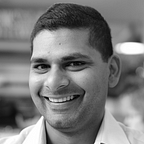Privacy Is the Right to Not Be Seen
Data is the new oil, but only because we took the right to remain in a blindspot for granted
As children, we love to be seen. Mommy, I’m on the trampoline, look at my cool drawing, look at what I’ve done. We’re enough and the world is light. But as we become adulterated the feeling changes, there are some things we don’t want other people to know about us. Perhaps we’re ashamed. Maybe we perceive a dissonance self and other.
Teenagers are very different from smaller children. As we get older, we carry more darkness. We may need to keep secrets or to have different views from our peers and society around us. We may quietly disagree and keep some things in someone else’s blindspot to protect them or to protect ourselves. We may need to fly under the radar. At times we keep things private, to build up courage so that when our reserves are full again we can say everything that we cannot say, right now.
What are some of our private rights?
We have the right to suffer in private and experience our own pain.
We have the right to refuse help, even though others may believe it would be best for us to accept it.
We have a right to disagree with everyone else.
We have the right to be invisible.
Ask any teenager how difficult it is to be simultaneously connected and invisible these days.
Right now the technology that we have invited into our lives has the power to track us, read us and understand our deepest thoughts and feelings. Yes, deep learning can read facial expressions and emotions. Technology also has the power to influence us, because “other people” and “other interests” would like to take charge of our limited power to choose, buy and vote.
Predators gather information and hunt in private until there is nothing that you can do, then they come out into the open and attack, taking what they want. They have their agenda, and peaceful co-existence is not a part of it. Power, like privacy, is asymmetrical.
There is plenty of evidence to suggest that the companies and products that we trust continue to cut corners when it comes to privacy. It’s not just the obvious data-hungry business models like Facebook, Google, and Amazon, the free Avast anti-virus program, that you thought was keeping you safe, is busy watching your every move and selling it to a third party.
Data is the new oil. But you can’t drink oil and you can’t eat data, unless you’re an algorithm or your empire depends on one.
By collecting our data that leaks out all over the internet, the “collective other” has knowledge and access to us, for better or ill. The question is, can we inoculate ourselves?
We can hide our behaviour using technology (like Tor and DuckDuckGo) and we can create digital noise by making our online behaviour less predictable. The trouble is that our extended digital identity is who we are, in the finest detail, and the services provided by data collectors like big tech (and secret tech) are so deeply hooked into our private realities that we can’t get away from them. It seems helpless. It’s extremely difficult to mask your digital identity and build it at the same time. What can be done?
We need to let the past, including our deepest fears and shames, quietly die.
Our vulnerabilities to the predatory “data other” are deeply connected to our capacity for self-deception which is, in turn, driven by our darkest fears. Is it shameful to be naked, vulnerable, seen, judged? Is it painful to be isolated and alienated? Is the loss permanent? What if you have to stand alone, and the rest of the world was wrong? Could you do it? Just ask Greta Thunberg. She’s carrying a torch, with a target on her back.
If we can find a cause that is meaningful enough to handle these fears, then perhaps we can accept that we have collectively created a world, where privacy is a luxury. And, then demand change.
We needed to see everything, because there was danger everywhere. And, the monster grew while we clicked along with it.
The data that’s being collected on us can only be used to the extent that we are vulnerable to manipulation. If we train ourselves to see past the clever, coordinated, deceptions of Cambridge Analytica, Clearview AI and the hundreds of would-be copycats that must exist by now, then we have a hope of being free.
It’s time to create tech to fight for privacy, before it is too late. It might already be too late. The hope for the future is that the next generation of lawmakers will be acutely tuned in, and have training in math and computer science too. In the space between, we’ll need to deal with the world as it is.
“Let everything happen to you.
Beauty and terror.
Just keep going.
No feeling is final.”― Rainer Maria Rilke.
